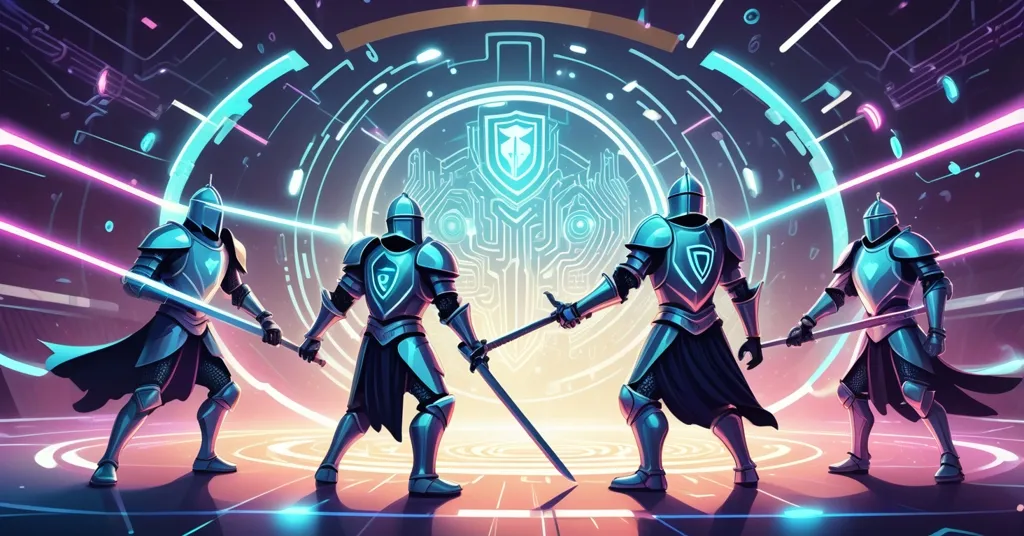$100M ZKP Challenges Monero and Zcash in Privacy Coin Battle with AI Edge

$100M Zero Knowledge Proof (ZKP) Takes on Monero and Zcash in Privacy Coin Showdown
Privacy isn’t just a feature in the crypto world—it’s a lifeline. With digital surveillance tightening its grip and data breaches becoming an everyday headache, privacy-focused cryptocurrencies are surging in demand. Monero (XMR) and Zcash (ZEC) are leading the charge with impressive market gains, but a new player, Zero Knowledge Proof (ZKP), backed by a whopping $100 million in pre-built infrastructure, is stepping into the ring with a bold claim to redefine the game.
- Privacy Powerhouses: Monero hits a five-month high, Zcash surges 53% in a week.
- ZKP’s Heavy Hit: $100M invested in a privacy-first AI network, already operational.
- Battle for Anonymity: Can a newcomer with real tech outshine proven giants?
Monero’s Unbreakable Shield: Still the King of Anonymity?
Monero has long been the go-to for anyone seeking untraceable transactions. Its price recently spiked over 9% to a five-month high of $378, though it’s hovering around $343 as of early November. For those new to crypto, Monero’s magic lies in its design: ring signatures mix your transaction with others to hide the sender, while stealth addresses mask the recipient. Unlike Bitcoin, where transactions are pseudonymous and can be traced with effort, Monero keeps your financial moves completely off-grid. That’s why it’s a favorite among privacy hawks, from activists to those just dodging Big Tech’s prying eyes.
But sustaining this rally isn’t a given. Monero faces resistance between $378 and $400, with support levels at $290-$320. Break through the ceiling, and $500 isn’t a pipe dream—especially with the Seraphis Upgrade looming in late 2025. This technical overhaul aims to boost transaction efficiency and improve wallet compatibility, potentially making Monero even more user-friendly. Yet, there’s a flip side: delays or hiccups in such a complex upgrade could frustrate users or erode confidence. And let’s be clear, Monero’s strength—total anonymity—makes it a constant target for regulators. It’s already been delisted from major exchanges like Binance in the past. Will this privacy titan keep its crown, or is the heat about to turn up?
Zcash’s Optional Anonymity: Institutional Muscle Fuels a Surge
Zcash is making waves of its own, trading at around $478 after a staggering 53% jump in just one week, pushing its market cap past Monero’s. What’s driving this bullish run? Big money, for starters. The Grayscale Zcash Trust holds $162 million in assets, and a recent $13.7 million whale investment shows institutional players are all in. For the uninitiated, Zcash differs from Monero by offering optional privacy. Using zero-knowledge proofs—a cryptographic trick that proves something is true without revealing the details—users can choose shielded addresses to hide transactions. Think of it as flashing a VIP pass without showing your name.
Zcash’s fundamentals look strong. The Halo 2 upgrade has sharpened its privacy tech, making shielded transactions faster and more efficient. Add to that a halving in November 2025, which will slash ZEC’s supply and could drive prices higher, and you’ve got serious momentum. BitMEX co-founder Arthur Hayes has even made a bold call:
Zcash could hit $10,000 to $20,000, given its technological maturity and the halving dynamics.
Let’s not get carried away, though. Such predictions are pure speculation, and we’re not here to peddle moonshot fantasies. Zcash faces resistance at $500, and while the long-term outlook is promising, crypto volatility is a savage beast—unpredictable and brutal. Community buzz on forums like Reddit shows excitement for the halving, but some worry it’s overhyped. Plus, Zcash’s optional privacy model still raises eyebrows among regulators who dislike anything they can’t fully monitor. Institutional backing might shield it somewhat, but for how long?
ZKP: The Privacy-AI Hybrid Shaking Up the Game
Now, enter Zero Knowledge Proof, or ZKP, the wildcard that’s got everyone talking. Unlike most crypto projects that fundraise on fluffy whitepapers and empty promises, ZKP has already poured $100 million into a fully operational privacy-first AI compute network—before even launching its token presale. That includes $20 million in live infrastructure and $17 million in hardware called Proof Pods, ready to ship. For those scratching their heads, think of Proof Pods as specialized computers that earn revenue by processing AI tasks while keeping data locked tight. It’s like a private vault for AI calculations: the results come out, but the sensitive info stays sealed. Learn more about how ZKP is challenging privacy giants like Monero and Zcash with its innovative approach.
ZKP’s pitch is ambitious, targeting a multi-trillion-dollar market where data security is everything. Imagine healthcare firms running AI models on patient data without leaks, or financial institutions crunching numbers without exposing trade secrets. This isn’t just another privacy coin; it’s a fusion of two cutting-edge fields—blockchain privacy and AI computation. Their presale whitelist is live now, with daily on-chain auctions to ensure fair token distribution and set a sustainable price. In a space riddled with ICO scams, this “build first, hype later” approach is a breath of fresh air—or dare I say, a rare crypto unicorn giving the middle finger to grifters.
But hold the applause. ZKP is unproven at scale, and execution risks loom large. Can it really merge privacy and AI compute without tripping over technical or market hurdles? Who’s even behind this $100 million war chest—VCs, private investors, or something shadier? Without transparency, there’s a whisper of centralization risk, a dirty word in our decentralized ethos. And while building first is commendable, doing so without early community input might mean missing the mark on user needs. Compared to other blockchain-AI projects like Fetch.AI, ZKP’s focus on privacy sets it apart, but it’s stepping into a crowded, cutthroat niche.
Regulatory Storm Clouds: The Biggest Threat to Privacy Tech?
Privacy tech’s biggest enemy isn’t competition—it’s regulation. Monero’s been kicked off exchanges for being too anonymous, with governments citing money laundering and illicit activity as excuses. Zcash, despite its optional privacy, still gets side-eyed by policymakers who hate anything they can’t track. ZKP might dodge some flak by focusing on compute rather than pure currency, but make no mistake: if it gains traction, regulators will come knocking. Real-world use cases for privacy tech are undeniable—whistleblowers, dissidents, or even just folks sick of Google hoarding their data—but centralized systems, from exchanges to Big Tech, often bend to government pressure. Will true anonymity ever be allowed to thrive, or are we fighting a losing battle against surveillance culture?
Privacy Tech vs. Bitcoin Maximalism: A Necessary Tension
Bitcoin maximalists in our community might scoff at privacy coins, arguing BTC’s Taproot upgrade already offers decent shielding with Schnorr signatures and MAST. Fair point—Bitcoin’s privacy is improving. But let’s not pretend it matches Monero’s total obfuscation or Zcash’s zero-knowledge finesse. Privacy coins fill a niche Bitcoin shouldn’t have to: absolute anonymity for those who need it most. And projects like ZKP push the boundary further, blending privacy with utility like AI compute. As champions of decentralization, we see this as healthy disruption, not betrayal. Bitcoin is the reserve currency of crypto, but altcoins carve out spaces where innovation demands specialization.
Key Takeaways: Unpacking the Privacy Coin Race
- What’s driving the surge in privacy coins like Monero and Zcash?
Rising fears of digital surveillance and data breaches are fueling demand for on-chain anonymity, reflected in Monero’s climb to $378 and Zcash’s 53% weekly spike, alongside institutional bets like the $162 million Grayscale Zcash Trust. - How does ZKP differentiate itself from other crypto projects?
With $100 million already sunk into a working privacy-first AI compute network, including real infrastructure and Proof Pods, ZKP flips the script on hype-driven fundraising by delivering tangible tech before asking for investor cash. - What are the price catalysts for Monero and Zcash ahead?
Monero could target $500 if it breaks $400 resistance, with the 2025 Seraphis Upgrade as a key driver, while Zcash eyes $500 short-term and speculative heights of $20,000, boosted by the Halo 2 upgrade and 2025 halving. - Is ZKP a solid long-term contender in the privacy space?
Its pre-built network, revenue-generating hardware, and fair auction model scream utility, but untested execution and potential centralization risks mean it’s a gamble—albeit a promising one if it delivers. - What risks should investors eye with privacy-focused crypto?
Monero and Zcash face regulatory crackdowns and price swings, while ZKP’s newcomer status adds uncertainty despite its groundwork. Crypto is high-stakes—research isn’t optional, it’s survival.
The Road Ahead for Privacy Tech: Hope and Hard Realities
Privacy tech stands at a crossroads. Monero and Zcash are battle-tested warriors, each wielding unique strengths—total anonymity for XMR, flexible shielding for ZEC—and upgrades that could solidify their dominance. ZKP is the wildcard, armed with serious funding and a novel privacy-AI hybrid model that could accelerate adoption faster than community-driven projects, aligning with our belief in effective accelerationism to disrupt the status quo. But the path forward is littered with traps: regulatory landmines, market volatility, and the ever-present specter of scams in crypto’s wild west.
Why does this matter? Because privacy isn’t a niche—it’s the future. Whether it’s shielding transactions for a dissident or securing AI data for a hospital, the need is real and growing. Yet, success hinges on balancing innovation with resilience against external threats. As advocates for decentralization and freedom, we cheer these projects for challenging surveillance norms, but we’re not blind to the hurdles. Monero, Zcash, and ZKP each represent a piece of the puzzle. Which will fit best in tomorrow’s world? That’s the million-dollar—or perhaps multi-trillion-dollar—question.



